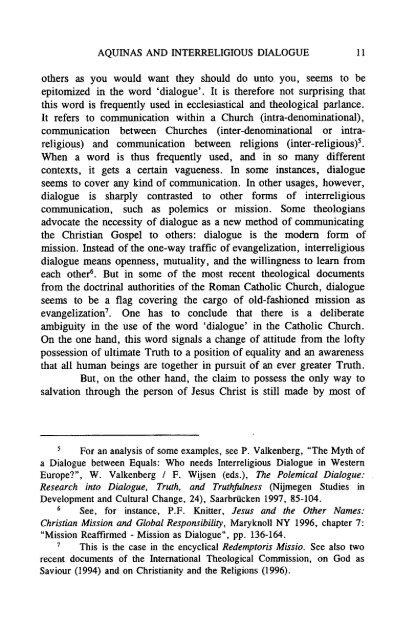Jaarboek Thomas Instituut 1997 - Thomas Instituut te Utrecht
Jaarboek Thomas Instituut 1997 - Thomas Instituut te Utrecht
Jaarboek Thomas Instituut 1997 - Thomas Instituut te Utrecht
Create successful ePaper yourself
Turn your PDF publications into a flip-book with our unique Google optimized e-Paper software.
AQUINAS AND INTERRELIGIOUS DIALOGUE 11<br />
others as you would want they should do unto. you, seems to be<br />
epitomized in the word 'dialogue'. It is therefore not surprising that<br />
this word is frequently used in ecclesiastical and theological parlance.<br />
It refers to communication within a Church (intra-denominational),<br />
communication between Churches (in<strong>te</strong>r-denominational or intrareligious)<br />
and communication between religions (in<strong>te</strong>r-religious)",<br />
When a word is thus frequently used, and in so many different<br />
con<strong>te</strong>xts, it gets a certain vagueness. In some instances, dialogue<br />
seems to cover any kind of communication. In other usages, however,<br />
dialogue is sharply contras<strong>te</strong>d to other forms of in<strong>te</strong>rreligious<br />
communication, such as polemics or mission. Some theologians<br />
advoca<strong>te</strong> the necessity of dialogue as a new method of communicating<br />
the Christian Gospel to others: dialogue is the modem form of<br />
mission. Ins<strong>te</strong>ad of the one-way traffic of evangelization, in<strong>te</strong>rreligious<br />
dialogue means openness, mutuality, and the willingness to learn from<br />
each other". But in some of the most recent theological documents<br />
from the doctrinal authorities of the Roman Catholic Church, dialogue<br />
seems to be a flag covering the cargo of old-fashioned mission as<br />
evangelization? One has to conclude that there is a delibera<strong>te</strong><br />
ambiguity in the use of the word 'dialogue' in the Catholic Church.<br />
On the one hand, this word signals a change of attitude from the lofty<br />
possession of ultima<strong>te</strong> Truth to a position of equality and an awareness<br />
that all human beings are together in pursuit of an ever grea<strong>te</strong>r Truth.<br />
But, on the other hand, the claim to possess the only way to<br />
salvation through the person of Jesus Christ is still made by most of<br />
For an analysis of some examples, see P. Valkenberg, "The Myth of<br />
a Dialogue between Equals: Who needs In<strong>te</strong>rreligious Dialogue in Wes<strong>te</strong>rn<br />
Europe?", W. Valkenberg / F. Wijsen (eds.), The Polemical Dialogue:<br />
Research into Dialogue, Truth, and Truthfulness (Nijmegen Studies in<br />
Development and Cultural Change, 24), Saarbrücken <strong>1997</strong>, 85-104.<br />
6 See, for instance, P.F. Knit<strong>te</strong>r, Jesus and the Other Names:<br />
Christian Mission and Global Responsibility, Maryknoll NY 1996, chap<strong>te</strong>r 7:<br />
"Mission Reaffirmed - Mission as Dialogue", pp. 136-164.<br />
? This is the case in the encyclical Redemptoris Missio. See also two<br />
recent documents of the In<strong>te</strong>rnational Theological Commission, on God as<br />
Saviour (1994) and on Christianity and the Religions (1996).








